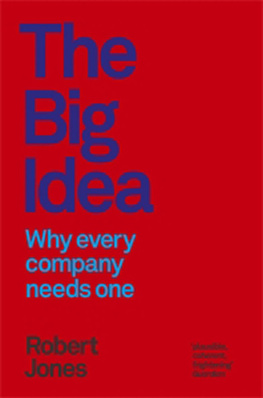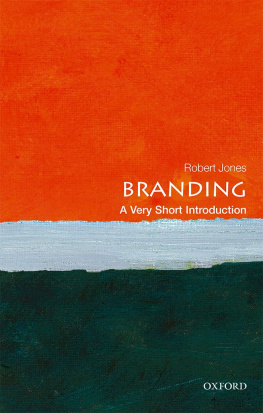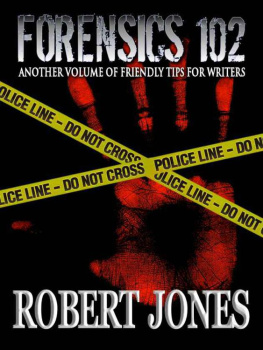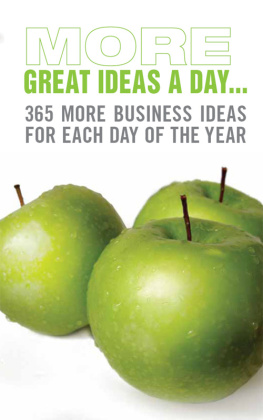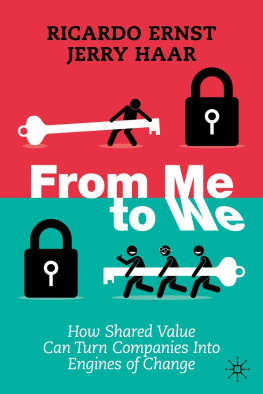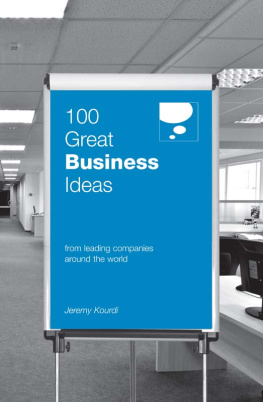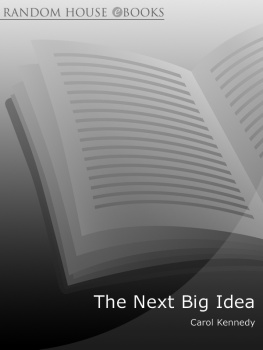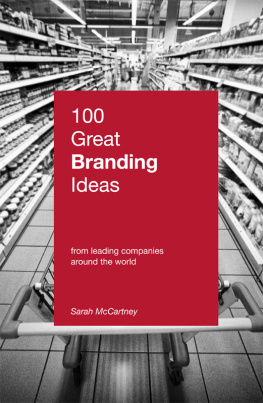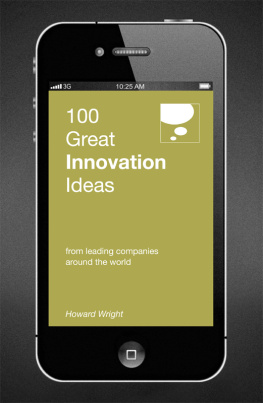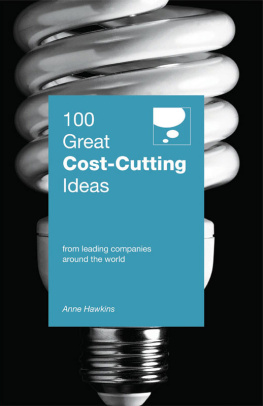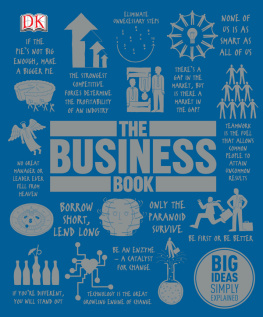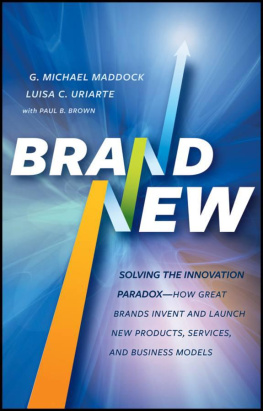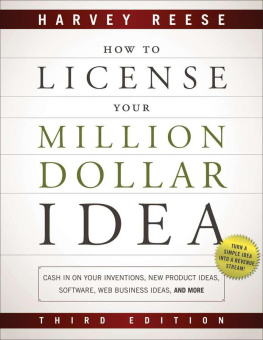Robert Jones is a consultant at Wolff Olins, the London, New York and Dubai brand business. He advises chief executives of national and global organizations on how to find their big idea and how to turn it into reality. He is also a senior business fellow at the University of East Anglia.
Hes fascinated by the human need for meaning and purpose. Most consumers, he believes, look for more than just the best price. And most employees want to do more than just make money. Providing that meaning and purpose is, in his view, the true role of branding.
Robert Jones lives in Highbury, North London.
The Big Idea
Why every company needs one
Robert Jones

Reissued in Great Britain in 2008 by
PROFILE BOOKS LTD
3a Exmouth House
Pine Street
London EC1R 0JH
www.profilebooks.com
First published by HarperCollinsBusiness in 2000
Copyright Robert Jones 2000, 2008
10 9 8 7 6 5 4 3 2 1
The right of Robert Jones to be identified as the author of this work has been asserted by him in accordance with the Copyright, Designs and Patents Act 1988.
All rights reserved. Without limiting the rights under copyright reserved above, no part of this publication may be reproduced, stored or introduced into a retrieval system, or transmitted, in any form or by any means (electronic, mechanical, photocopying, recording or otherwise), without the prior written permission of both the copyright owner and the publisher of this book.
A CIP catalogue record for this book is available from the British Library.
ISBN 978 1 84668 274 2
Printed and bound in the UK by
CPI Bookmarque, Croydon CR0 4TD

contents
foreword
I wrote this book in 2000 at the height of the dot-com boom, a time of heady and sometimes naive optimism. Rereading it in todays harsher climate, I think we need that optimism back.
More than ever, organizations need a big idea to drive them. In a sceptical, fearful, conservative world, they need an idea thats radical: an ambition to challenge conventions and change experiences, to do different and do better. They need an idea thats social: widely shared, by customers and employees. And most importantly of all, they need an idea thats tangible thats evident in the products or services they provide.
Eight years on, that last point needs most emphasis. People these days believe reality, not image. Consumers are even better informed, better able to do comparison shopping online, better able to decode branding, better able to give and share feedback on big companies.
Pure idea, pure story, pure myth no longer works. Thats why most advertising these days at least in the more sophisticated economies is about features and prices, not about big abstract promises. And its why brand experts are concentrating much less on soft image-making, and much more on the hard stuff: creating new products and services that deliver a brand idea.
The most admired brands now are the ones that do something well. Google, for example, which really does what it says organize the worlds information. Apple, which demonstrates its big idea about making technology usable through iPod, iTunes and iPhone. And in the UK, John Lewis, which really does provide a non-adversarial way of shopping.
This chilly new world places a huge demand on organizations: you have to deliver your reality, day after day after day. Indeed, you have to get better. Or people will go elsewhere.
And you can see this most sharply online, where its become hard to build traditional brand loyalty. People readily shift, for example, from MySpace to Facebook to whatevers next. People are much less ready to buy into brands. instead they want to use brands. And when something more useful comes along, theyll adopt it.
Thats the challenge for the big idea of the future: it has to be useful, and stay useful.
Id like to thank again all the business leaders I interviewed: Andrew Armishaw, Nancy Brown Johnson, Sir John Browne, Barbara Cassani, Martin Drury, Eduoard Ettegui, Jane Frost, Rob Furness, Akira Gemma, Sir Richard Greenbury, Rajat Gupta, Sir Stuart Hampson, Patrick Holden, Michael Jackson, Ingvar Kamprad, Ariga Kaoru, Bruce Kemp, Anders Knutsen, Brian Larcombe, Terry Leahy, Julian Metcalfe, Mark Moody-Stuart, Deepak Parekh, Peter Pearce, Alan Rusbridger, Andrew Smith, Hans Snook, Ratan Tata, Alun Thomas and Thomas Wellauer. Many friends and colleagues provided ideas, comments, objections and suggestions: most of all, Val Allam and Jules Lubbock. I couldnt have written the book without my research assistants, Sean McKnight, Veronika Tarasowa and Carmen Miranda; my agent, Andrew Lownie; and my original editor, Lucinda McNeile. And Im grateful to Andrew Franklin of Profile for bringing out this new edition. Brian Boylan, chairman of Wolff Olins, was my mentor then, and still is now. Most important of all, Neil McKenna, my partner, did more than anyone to make this book happen. No one could have been more devoted in guiding the project across the shadow between conception and creation, between the initial impulse and the printed book. Thank you.
Robert Jones
November 2008
PROLOGUE
hello, in twelve languages
Visit the London headquarters of Orange, and the first thing you see is a banner over reception saying hello in a dozen different languages. The next thing you notice is the sign pointing to the top-floor imaginarium and the office of the director of futurology. You know that something special is going on here.
Orange is one of the worlds most remarkable communication companies. Five years ago, it didnt exist. Now, its the best-performing British mobile phone network, and there are Orange networks in a dozen other countries, from Holland to Hong Kong. Most significantly of all, in a fickle marketplace, Orange has the most loyal of customers: its churn rate the number of customers who defect each year is significantly lower than the industry standard.
What has driven all this?
Not its technical performance, or its customer service, or its pricing. Coverage and call quality are good, but you can wait hours to get through to Oranges call centre; and other networks are cheaper.
Nor is it Oranges business model thats changing. Originally Orange thought it was in the wire-free business, but now its evolving into a much broader kind of communication company, offering services people reach from their highly wired-up PCs.
What drives Orange is the conviction with which it was set up. The two hundred people who created Orange shared a view, not about what technology could do, but about what it ought to do for people. They didnt see why mobile phones should be bulky or hard to use. They rejected the first phone Nokia developed for them it was just too big. They didnt see why people should be forced to pay for itemized billing. They knew that market research wouldnt tell them what services to provide as they say, you cant research the future. But they could see (sometimes faintly) a million new things people would be able to do, once mobile phones were ubiquitous. And they could see that Orange would be there, providing all those things.
Its very hard to put this view into words. Theyve tried. They have a mission statement, a philosophy statement, and no fewer than three different lists of values. But these are all just words. Recently, theyve started using a phrase, a bright human future, but some of their people feel uneasy about it: the very word human sounds inhuman, sounds like science fiction.
Next page
